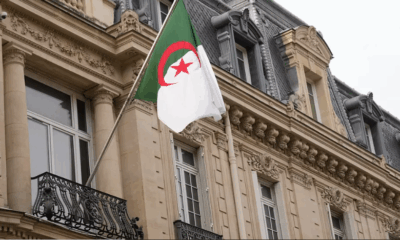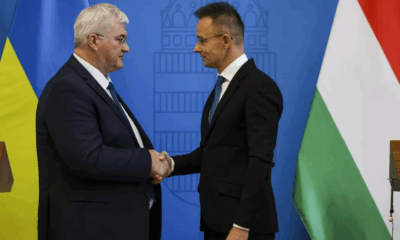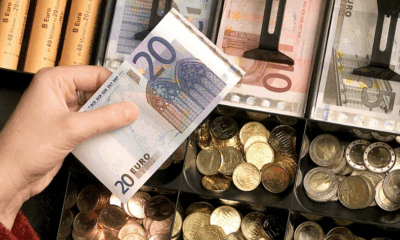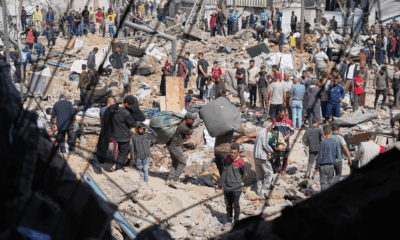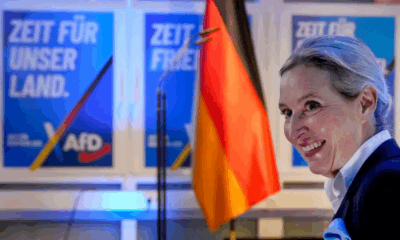News
European Markets Rebound as Asia Recovers from Sell-Off
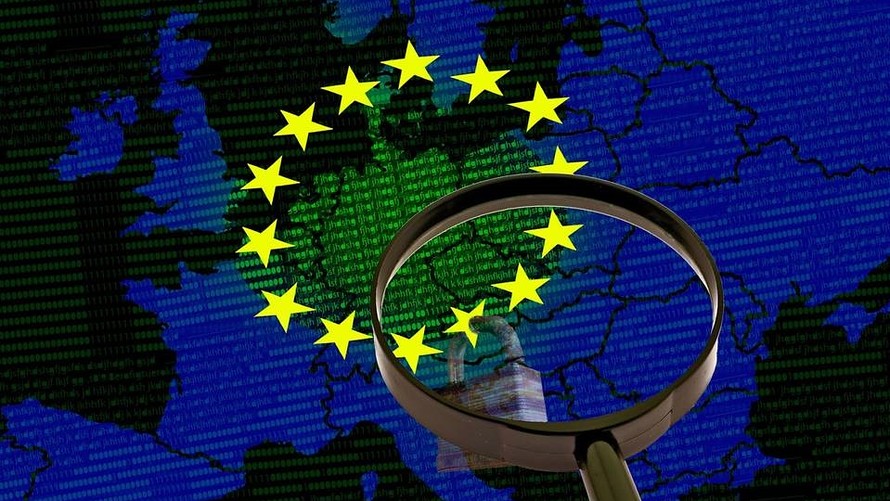
European markets opened higher on Tuesday with Germany’s DAX, France’s CAC 40, and London’s FTSE 100 all showing gains after a significant sell-off on Monday.
Japan’s benchmark Nikkei 225 index soared nearly 11% on Tuesday, recovering from a sharp drop that had contributed to a global market slump on Monday. Other Asian markets also saw a rebound, though to a lesser extent, indicating a stabilization after the week’s turbulent start.
Monday’s market plunge was reminiscent of the 1987 crash, sparking fears of a slowing US economy. The Nikkei gained nearly 11% early Tuesday and was trading 10.3% higher by early afternoon as investors sought bargains after the previous day’s 12.4% drop. On Monday, the S&P 500 dropped 3%, marking its worst day in nearly two years, closing at 5,186.33. The Dow Jones Industrial Average fell by 1,033 points, or 2.6%, to 38,703.27, while the Nasdaq composite slid 3.4% to 16,200.08 as major tech companies like Apple and Nvidia experienced significant losses.
The global sell-off that began last week was further fueled by a report showing a slowdown in US hiring, raising concerns that the Federal Reserve’s prolonged high interest rates might be stifling the economy too severely. A report from the Institute for Supply Management on Monday showed slight growth in US services businesses, particularly in arts, entertainment, recreation, accommodations, and food services.
Professional investors cautioned that technical factors might have amplified the steep losses. South Korea’s Kospi index dropped 8.8% on Monday, and Bitcoin fell below $54,000 from over $61,000 on Friday. Even gold, typically a safe haven during market turmoil, slipped about 1%.
On Tuesday, nearly all Asian markets, except Singapore, saw gains. The Kospi jumped 4.3% to 2,546.64. Hong Kong’s Hang Seng index rose 0.5% to 16,775.65. Australia’s S&P/ASX 200 edged 0.3% higher to 7,677.50. Taiwan’s Taiex gained 1.2% after an 8.4% drop the day before. The Shanghai Composite index, which had largely bypassed Monday’s turmoil, was up slightly to 2,861.87.
The dramatic market moves reflect fears that the US economy might be harmed by the Federal Reserve’s high interest rates, leading to speculation about a possible emergency rate cut. The yield on the two-year Treasury, closely tied to Fed expectations, briefly sank below 3.70% on Monday before recovering to 3.89%.
“The Fed could ride in on a white horse to save the day with a big rate cut, but the case for an inter-meeting cut seems flimsy,” said Brian Jacobsen, chief economist at Annex Wealth Management, noting that such actions are usually reserved for emergencies.
Despite the recent declines, the US economy is still growing, and a recession is not certain. The stock market remains up significantly for the year, with double-digit gains for the S&P 500, Dow, and Nasdaq Composite.
Other factors contributing to Monday’s market plunge include the Bank of Japan’s recent interest rate hike, which led to a stronger yen and impacted global trading strategies. Big Tech companies, particularly those involved in artificial intelligence like Nvidia, saw sharp declines amid fears that their stock prices had risen too quickly.
In commodities, early Tuesday saw US benchmark crude oil up $1.18 to $74.12 per barrel, and Brent crude rising $1.00 to $77.30 per barrel. The euro edged up to $1.0956 from $1.0954.
As markets continue to react to economic data and global events, the path forward remains uncertain, but Tuesday’s gains suggest a temporary stabilization after a volatile start to the week.
News
France, Algeria Expel Diplomats in Escalating Diplomatic Dispute
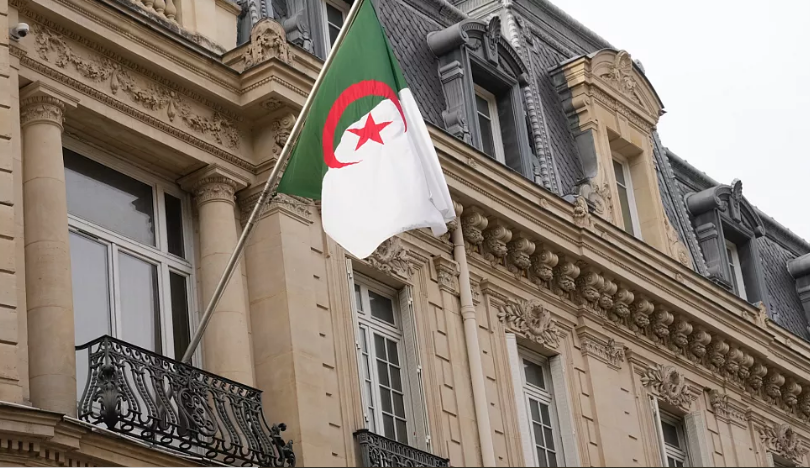
Tensions between France and Algeria have escalated further this week, as both nations continue a tit-for-tat expulsion of diplomats in a worsening diplomatic standoff.
France announced on Wednesday that it will expel an unspecified number of Algerian diplomats in direct response to Algeria’s decision to remove 15 French officials from the country over the weekend. This follows an earlier episode in mid-April, when Algeria expelled 12 French diplomatic personnel, prompting France to retaliate by expelling an equal number of Algerian officials and recalling its ambassador from Algiers.
French Foreign Minister Jean-Noël Barrot confirmed the latest move during an interview with BFM TV, stating that Algerian officials holding diplomatic passports but lacking valid visas to operate in France would be required to leave. He declined to specify the exact number of expulsions, saying, “It’s not so much a question of numbers, it’s a question of quality. Algeria wanted to send back our agents — we’re sending back theirs.”
On Tuesday, the French Foreign Ministry summoned Algeria’s chargé d’affaires to formally notify him of the decision. The diplomatic escalation came just two days after Algeria had informed France’s chargé d’affaires in Algiers that 15 French civil servants on temporary assignments would be expelled.
While Algeria’s Foreign Ministry has yet to release an official statement, the state-run Algerian Press Agency (APS) reported that the expelled French personnel were appointed under what it described as “irregular conditions.”
France responded with a sharply worded statement accusing Algeria of breaching a 2013 bilateral agreement, which governs the movement and duties of officials holding diplomatic, official, or service passports. The statement condemned Algeria’s “new conditions of access” for French officials and described the expulsion as unjustified.
Barrot characterized Algeria’s action as “incomprehensible and brutal,” and insisted that France’s response was “immediate, firm, and proportionate.” He added that further measures could be taken depending on the evolution of the situation.
The dispute adds to a growing list of irritants in Franco-Algerian relations. Key points of contention include Algeria’s refusal to repatriate nationals facing deportation from France and the continued detention of dissident Franco-Algerian writer Boualem Sansal.
Relations took a significant downturn in July 2024, when France expressed support for Morocco’s claim to Western Sahara — a move that angered Algiers, a staunch supporter of Sahrawi self-determination.
Although French President Emmanuel Macron and Algerian President Abdelmadjid Tebboune shared a reportedly positive phone conversation in early April, hopes of a diplomatic thaw appear to have been short-lived.
News
EU Seeks Closer Defence Ties with Ukraine, Citing Battle-Tested Innovation

The European Union has launched a new initiative to deepen defence cooperation with Ukraine, drawing on the war-torn country’s battlefield experience to strengthen European capabilities in key areas such as drone production.
The EU-Ukraine Defence Industries Task Force held its inaugural meeting on Monday, aiming to enhance industrial collaboration between Kyiv and Brussels. The effort was announced by European Commissioner for Defence and Space Andrius Kubilius during the second EU-Ukraine Defence Industry Forum.
Kubilius emphasized the urgency of integrating Ukraine’s rapidly evolving defence sector into Europe’s broader security framework, particularly in light of its advancements in unmanned systems and supply chain resilience.
“Today, we announce the creation of the inter-institutional EU-Ukraine Task Force,” he said. “Ukrainian and European experts will now work together to develop joint projects and facilitate procurement processes that strengthen both our defence industries.”
The task force will focus on priority capabilities, especially explosives and drones. According to Kubilius, Ukraine’s innovation in drone production has positioned it as a global leader in the field. “We need to learn from Ukraine how to create a drone production and operation infrastructure,” he said, asserting that Europe stands to gain even more from this integration than Ukraine.
Since Russia’s full-scale invasion in 2022, Ukraine has increased its annual defence production capacity to €35 billion — a 35-fold rise. Kubilius highlighted Ukraine’s ability to deliver modern, cost-effective defence solutions, describing its companies as “fast” and capable of producing at “half the price” of their European counterparts.
Alexander Kamyshin, an advisor to President Volodymyr Zelenskyy, told the forum that the ongoing conflict would be remembered as “the first world drone war.” He noted Ukraine’s success in developing autonomous targeting systems and swarming drone capabilities, technologies he said the country is willing to share with European allies.
“We’re here to build the arsenal of the free world together,” Kamyshin declared.
The EU is set to invest heavily in its defence sector over the next four years, including up to €650 billion in new fiscal allocations and €150 billion through a new loan programme dubbed SAFE. The initiative is designed to support joint procurement and could benefit Ukrainian firms as well.
Talks on the SAFE programme are expected to conclude by the end of May, with disbursements likely to begin by early 2026. Meanwhile, a broader strategic planning effort, including a new Industry Outlook based on member states’ capability targets, is set to be unveiled in June.
“Peace through strength will come from production power and brain power,” Kubilius said. “To stop Putin, we need to produce more, innovate more, and we need to do that together: in the EU and with Ukraine.”
Would you like a version of this tailored for print or online publication?
News
Spy Scandal Strains Hungary-Ukraine Relations as Minority Rights Talks Collapse
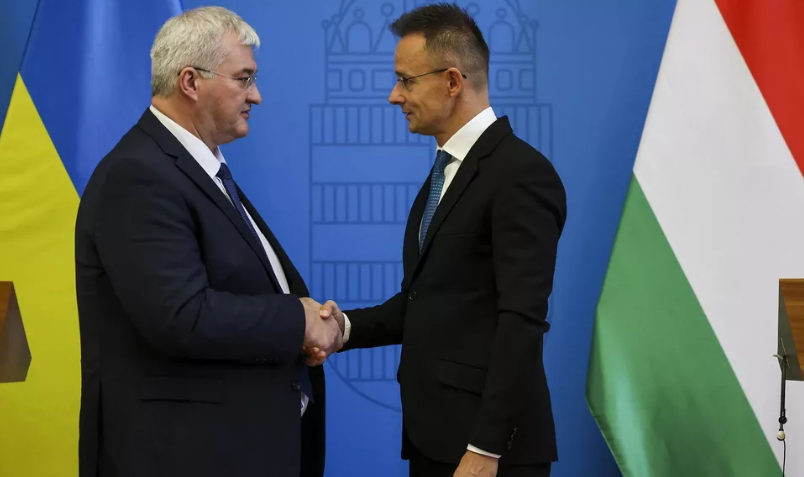
A deepening espionage scandal has plunged Hungary and Ukraine into a new diplomatic rift, with Budapest abruptly suspending planned talks on the rights of ethnic Hungarians in Ukraine’s Transcarpathia region.
According to Ukrainian officials, negotiations that were due to take place on May 12 in Uzhhorod were called off at the last minute by Hungary, despite the Ukrainian delegation already having arrived in the border town. The discussions were meant to address 11 Hungarian recommendations to strengthen the rights of the Hungarian minority living in the southwestern Carpathian region.
The suspension comes amid a growing diplomatic row sparked by Ukrainian allegations of Hungarian espionage. On May 9, Ukraine’s Security Service (SBU) announced that it had uncovered a Hungarian military intelligence network operating on Ukrainian territory. Two former Ukrainian soldiers were detained, accused of collecting sensitive military information for Budapest. The network was reportedly overseen by a Hungarian intelligence officer.
In response, Ukraine expelled two Hungarian diplomats. Hungary retaliated in kind, expelling two Ukrainian officials. Hungarian Foreign Minister Péter Szijjártó dismissed the allegations as “propaganda,” stating that Hungary had not received any formal communication from Kyiv regarding the charges.
Tensions escalated further on Friday when Hungary’s Counter-Terrorism Centre detained a Ukrainian citizen in central Budapest. According to Hungarian authorities, the individual—described as a middle-aged man previously operating under diplomatic cover—was expelled from the country overnight for espionage. The National Directorate General for Aliens determined that his activities posed a “serious threat to Hungary’s sovereignty.”
“The individual was deported after the situation was clarified,” the Hungarian government said in a statement, adding that the suspect no longer had diplomatic immunity.
The deteriorating relations have cast a shadow over longstanding concerns about minority rights in Transcarpathia, where ethnic Hungarians have lived for generations. Hungary has frequently criticized Ukraine for failing to uphold linguistic and cultural rights, while Kyiv has accused Budapest of interfering in its internal affairs.
With both sides now trading expulsions and suspending dialogue, the prospects for resolving the minority rights dispute — or cooling tensions more broadly — appear increasingly uncertain.
The incident marks the latest flashpoint in what has been a historically uneasy relationship between the two neighbours, now further complicated by war, security fears, and mounting geopolitical pressure.
-

 Business12 months ago
Business12 months agoSaudi Arabia’s Model for Sustainable Aviation Practices
-

 Business12 months ago
Business12 months agoRecent Developments in Small Business Taxes
-

 Politics12 months ago
Politics12 months agoWho was Ebrahim Raisi and his status in Iranian Politics?
-

 Business10 months ago
Business10 months agoCarrectly: Revolutionizing Car Care in Chicago
-

 Business11 months ago
Business11 months agoSaudi Arabia: Foreign Direct Investment Rises by 5.6% in Q1
-

 Technology12 months ago
Technology12 months agoComparing Apple Vision Pro and Meta Quest 3
-

 Politics12 months ago
Politics12 months agoIndonesia and Malaysia Call for Israel’s Compliance with ICJ Ruling on Gaza Offensive
-

 Sports9 months ago
Sports9 months agoKeely Hodgkinson Wins Britain’s First Athletics Gold at Paris Olympics in 800m

